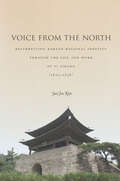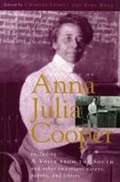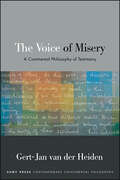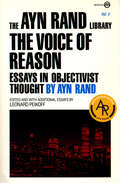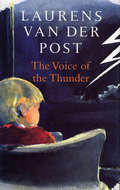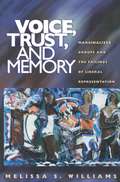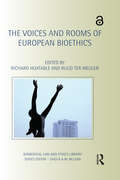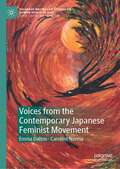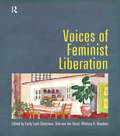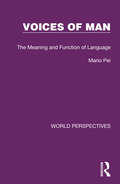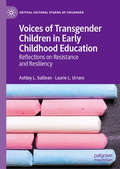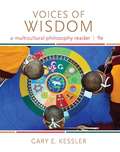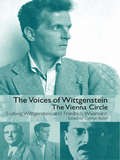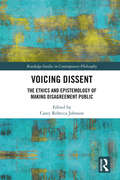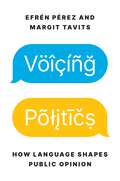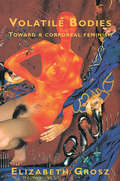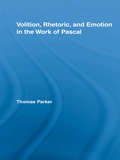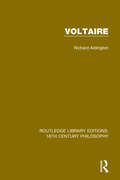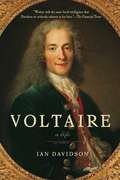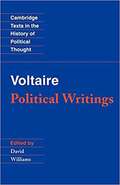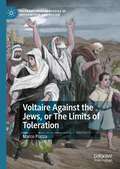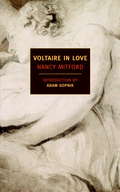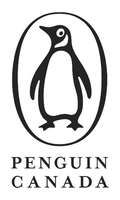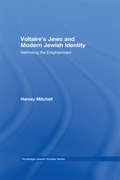- Table View
- List View
Voice from the North: Resurrecting Regional Identity Through the Life and Work of Yi Sihang (1672-1736)
by Sun Joo KimVoice from the Northresurrects the forgotten historical memory of the people and region in late Choson Korea while also enriching the social history of the country. Sun Joo Kim accomplishes this by examining the life and work of Yi Sihang, a historically obscure person from a hinterland in Korea's northwestern region who was also a member of the literati. Unlike many of his contemporaries, Yi Sihang left numerous writings on his region's history and culture, and on the political and social discrimination that he and others in his region faced from the central elite. This work explores a regional history and culture through the frames of microhistory and historical memory. Kim criticizes the historiographical problem of "otherizing" the northern region and fills a gap in Korean historiography—the lack of historical study of the northern region from a regional perspective, P'yongan Province in particular. The biographical format of this work engages readers in the investigation of a person's life within the changing world of his time and also creates a space where private and public intersect. Kim places Yi Sihang at the center of the historical stage while describing, analyzing, and reconstructing the world around him through his life story.
The Voice of Anna Julia Cooper: Including A Voice from the South and Other Important Essays, Papers, and Letters (Legacies of Social Thought)
by Anna Julia CooperRecently Anna Julia Cooper has emerged as the most important classic writer in the tradition of African American feminist thought. Mary Helen Washington described Cooper's work as "the most precise, forceful, well-argued statement of black feminist thought to come out of the nineteenth century." This is the first collection of all of Cooper's major writings, including many never before published. It includes all of the essays from her famous book, A Voice from the South, in addition to many other essays and letters accessible only in archives until now. The organization of this important new collection lends itself to a clearer understanding of the major themes and contributions of Cooper's thought, her development as a thinker and writer, and the critiques and controversies surrounding her work. Lemert and Bhan introduce Cooper as an activist, settlement founder, school teacher, college president, linguist, and scholar—a life that paralleled the prodigious accomplishments of W.E.B. Du Bois in so many ways.
The Voice of Misery: A Continental Philosophy of Testimony (SUNY series in Contemporary Continental Philosophy)
by Gert-Jan van der HeidenFrom analytic epistemology to gender theory, testimony is a major topic in philosophy today. Yet, one distinctive approach to testimony has not been fully appreciated: the recent history of contemporary continental philosophy offers a rich source for another approach to testimony. In this book, Gert-Jan van der Heiden argues that a continental philosophy of testimony can be developed that is guided by those forms of bearing witness that attest to limit experiences of human existence, in which the human is rendered mute, speechless, or robbed of a common understanding. In the first part, Van der Heiden explores this sense of testimony in a reading of several literary texts, ranging from Plato's literary inventions to those of Kierkegaard, Melville, Soucy, and Mortier. In the second part, based on the orientation offered by the literary experiments, Van der Heiden offers a more systematic account of testimony in which he distinguishes and analyzes four basic elements of testimony. In the third part, he shows what this analysis implies for the question of the truth and the truthfulness of testimony. In his discussion with philosophers such as Heidegger, Derrida, Lyotard, Agamben, Foucault, Ricoeur, and Badiou, Van der Heiden also provides an overview of how the problem of testimony emerges in a number of thinkers pivotal to twentieth- and twenty-first-century thought.
The Voice of Reason: Essays in Objectivist Thought
by Ayn Rand Leonard PeikoffBetween 1961, when she gave her first talk at the Ford Hall Forum in Boston, and 1981, when she gave the last talk of her life in New Orleans, Ayn Rand spoke and wrote about topics as varied as education, medicine, Vietnam, and the death of Marilyn Monroe. In The Voice of Reason, these pieces, written in the last decades of Rand's life, are gathered in book form for the first time. With them are five essays by Leonard Peikoff, Rand's longtime associate and literary executor. The work concludes with Peikoff's epilogue, "My Thirty Years With Ayn Rand: An Intellectual Memoir," which answers the question "What was Ayn Rand really like?" Important reading for all thinking individuals, Rand's later writings reflect a life lived on principle, a probing mind, and a passionate intensity. This collection communicates not only Rand's singular worldview, but also the penetrating cultural and political analysis to which it gives rise.
The Voice of Reason
by Ayn Rand Leonard PeikoffBetween 1961, when she gave her first talk at the Ford Hall Forum in Boston, and 1981, when she gave the last talk of her life in New Orleans, Ayn Rand spoke and wrote about topics as varied as education, medicine, Vietnam, and the death of Marilyn Monroe. In The Voice of Reason, these pieces, written in the last decades of Rand's life, are gathered in book form for the first time. With them are five essays by Leonard Peikoff, Rand's longtime associate and literary executor. The work concludes with Peikoff's epilogue, "My Thirty Years With Ayn Rand: An Intellectual Memoir," which answers the question "What was Ayn Rand really like?" Important reading for all thinking individuals, Rand's later writings reflect a life lived on principle, a probing mind, and a passionate intensity. This collection communicates not only Rand's singular worldview, but also the penetrating cultural and political analysis to which it gives rise.
The Voice of the Thunder
by Sir Laurens Van Der PostFrom the beginning, Lauren Van Der Post has been aware of a dimension in life far longer and more significant than the outer eventfulness of everyday living. His perception of life's mysterious power began with the Bushman, the first people of his native Africa, and grew in the universal imagery of dreams, the fertile legends and stories of ancient civilization, the intuitive teaching of prophets, poets and other pioneers of human awareness. In this book he has brought together two of his most deeply felt and far reaching essays, and has extended their message with great imaginative insight, exploring the potential in all men and women to acquire self-knowledge and to live life according to its fundamental precepts.
Voice, Trust, and Memory: Marginalized Groups and the Failings of Liberal Representation
by Melissa S. WilliamsDoes fair political representation for historically disadvantaged groups require their presence in legislative bodies? The intuition that women are best represented by women, and African-Americans by other African-Americans, has deep historical roots. Yet the conception of fair representation that prevails in American political culture and jurisprudence--what Melissa Williams calls "liberal representation"--concludes that the social identity of legislative representatives does not bear on their quality as representatives. Liberal representation's slogan, "one person, one vote," concludes that the outcome of the electoral and legislative process is fair, whatever it happens to be, so long as no voter is systematically excluded. Challenging this notion, Williams maintains that fair representation is powerfully affected by the identity of legislators and whether some of them are actually members of the historically marginalized groups that are most in need of protection in our society.Williams argues first that the distinctive voice of these groups should be audible within the legislative process. Second, she holds that the self-representation of these groups is necessary to sustain their trust in democratic institutions. The memory of state-sponsored discrimination against these groups, together with ongoing patterns of inequality along group lines, provides both a reason to recognize group claims and a way of distinguishing stronger from weaker claims. The book closes by proposing institutions that can secure fair representation for marginalized groups without compromising principles of democratic freedom and equality.
The Voices and Rooms of European Bioethics (Biomedical Law and Ethics Library)
by Richard Huxtable Ruud Ter MeulenThis book reflects on the many contributions made in and to European bioethics to date, in various locations, and from various disciplinary perspectives. In so doing, the book advances understanding of the academic and social status of European bioethics as it is being supported and practiced by various disciplines such as philosophy, law, medicine, and the social sciences, applied to a wide range of areas. The European focus offers a valuable counter-balance to an often prominent US understanding of bioethics. The volume is split into four parts. The first contains reflection on bioethics in the past, present and future, and also considers how comparison between countries and disciplines can enrich bioethical discourse. The second looks at bioethics in particular locations and contexts, including: policy, boardrooms and courtrooms; studios and virtual rooms; and society, while the third part explores the translation of theories and concepts of bioethics into the clinical setting. The fourth and final section focuses on academic expressions of bioethics, as it is theorised in various disciplines and also as it is taught, whether in classrooms or at the patient’s bedside. The book features unique contributions from a range of experts including: Alastair V Campbell; Ruth Chadwick; Angus Dawson; Raymond G. De Vries; Suzanne Ost; Renzo Pegoraro; Rouven Porz; Paul Schotsmans; Jochen Vollmann; Guy Widdershoven and Hub Zwart. Chapter 10 of this book ''You Don't Need Proof When You've Got Instinct!': Gut Feelings and Some Limits to Parental Authority' by Giles Birchley is available under an open access CC BY NC ND license and can be viewed at: http://www.tandfebooks.com/userimages/ContentEditor/1438250845242/9780415737197_chapter10.pdf .
Voices from the Contemporary Japanese Feminist Movement (Palgrave Macmillan Studies on Human Rights in Asia)
by Emma Dalton Caroline NormaThis book introduces six key influential feminist activists from Japan’s contemporary feminist movement and examines Japanese women’s experience of and contribution to the international #MeToo movement. Set against a backdrop of pervasive sexual inequality in Japanese society—on a scale that makes Japan an outlier in Asia as well as the rest of the advanced democratic world—this book offers a snapshot of Japan’s contemporary feminist movement and the issues it faces, including, primarily, sexual violence and harassment of women and girls. The six feminist activists interviewed to create this snapshot all work toward eradicating sexual violence against women and girls—they are: Kitahara Minori (instigator of the Flower Demo and public commentator), Yamamoto Jun (activist for sex crime law amendments), Nitō Yumeno (advocate for sexually exploited girls), Tsunoda Yukiko (feminist lawyer), Mitsui Mariko (former politician and current activist), and Yang-Ching-Ja (comfort women activist).
Voices of Feminist Liberation: Writings In Celebration Of Rosemary Radford Ruether
by Emily Leah Silverman Dirk von der Horst Whitney Bauman'Voices of Feminist Liberation' brings together a wide range of scholars to explore the work of Rosemary Radford Ruether, one of the most influential feminist and liberation theologians of our time. Ruether's extraordinary and ground-breaking thinking has shaped debates across liberation theology, feminism and eco-feminism, queer theology, social justice and inter-religious dialogue. At the same time, her commitment to practice and agency has influenced sites of local resistance around the world as well as on globalised strategies for ecological sustainability and justice. 'Voices of Feminist Liberation' examines the potential of Ruether's thinking to mobilize critical theology, social theory and cultural practice. The scholars gathered here present their personal engagements with Ruether's thinking and teaching. The book will be invaluable to scholars, policy-makers, and activists seeking to understand how colonial and patriarchal oppression in the name of religion can be confronted and defeated.
Voices of Man: The Meaning and Function of Language (World Perspectives #8)
by Mario PeiOriginally published in 1964, this book examines where and how the pattern and texture of speech emerged and whether language is logical. It looks at linguistics from both the historical and descriptive points of view, as a physical science and as a social science. It also discusses the problem of aesthetics in language and what happens when different languages come into contact with each other. The book concludes with a discussion of the possibility of an international language, and indeed whether such a development would be progress or something that is needed or wanted.
Voices of Transgender Children in Early Childhood Education: Reflections on Resistance and Resiliency (Critical Cultural Studies of Childhood)
by Ashley L. Sullivan Laurie L. UrraroThis volume explores transgender children and internalized body normalization in early childhood education settings, steeped in critical methodologies including post-structuralism, queer theory, and feminist approaches. The book marries theory and praxis, submitting to current and future teachers a text that not only presents authentic narratives about trans children in early childhood education, but also analyzes the forces at work behind gender policing, gender segregation, and transphobic education policies. As the struggles and triumphs of trans individuals have reached a watershed moment in the social fabric of the United States, this text offers a snapshot into the lives of ten transgender people as they reflect on their earliest memories in the American educational system.
Voices of Wisdom: A Multicultural Philosophy Reader 9th Edition
by Gary E. KesslerIntroduces readers to basic philosophical questions in ethics, epistemology, and metaphysics through a collection of engaging and culturally diverse readings. Both classic and contemporary in its approach, this revised and updated Ninth Edition includes key texts from the Buddha, Plato, Immanuel Kant, Martin Luther King, Jr. , John Rawls, Martha Nussbaum, Nelson Mandela and others. Using these landmark writings, VOICES OF WISDOM: A MULTICULTURAL PHILOSOPHY READER, 9E takes readers on a multicultural journey through such topics as terrorism, civil disobedience, homosexuality, human rights, animal rights, language, truth, and power.
The Voices of Wittgenstein: The Vienna Circle
by Friedrich WaismannThe Voices of Wittgenstein brings for the first time, in both the original German and in English translation, over one hundred short essays in philosophical logic and the philosophy of mind. This text is of key historical importance to understanding Wittgenstein's philosophical thought and development in the 1930's. Transcribed from the papers of Friedrich Waismann and dating from 1932 to 1935, the majority are highly important dictations by Wittgenstein to Waismann. It also includes texts of redrafted material by Waismann, closely based on these dictations.
Voicing Dissent: The Ethics and Epistemology of Making Disagreement Public (Routledge Studies in Contemporary Philosophy)
by Casey Rebecca JohnsonDisagreement is, for better or worse, pervasive in our society. Not only do we form beliefs that differ from those around us, but increasingly we have platforms and opportunities to voice those disagreements and make them public. In light of the public nature of many of our most important disagreements, a key question emerges: How does public disagreement affect what we know? This volume collects original essays from a number of prominent scholars—including Catherine Elgin, Sanford Goldberg, Jennifer Lackey, Michael Patrick Lynch, and Duncan Pritchard, among others—to address this question in its diverse forms. The book is organized by thematic sections, in which individual chapters address the epistemic, ethical, and political dimensions of dissent. The individual contributions address important issues such as the value of disagreement, the nature of conversational disagreement, when dissent is epistemically rational, when one is obligated to voice disagreement or to object, the relation of silence and resistance to dissent, and when political dissent is justified. Voicing Dissent offers a new approach to the study of disagreement that will appeal to social epistemologists and ethicists interested in this growing area of epistemology.
Voicing Politics: How Language Shapes Public Opinion (Princeton Studies in Political Behavior #45)
by Efrén Pérez Margit TavitsWhy your political beliefs are influenced by the language you speakVoicing Politics brings together the latest findings from psychology and political science to reveal how the linguistic peculiarities of different languages can have meaningful consequences for political attitudes and beliefs around the world. Efrén Pérez and Margit Tavits demonstrate that different languages can make mental content more or less accessible and thereby shift political opinions and preferences in predictable directions. They rigorously test this hypothesis using carefully crafted experiments and rich cross-national survey data, showing how language shapes mass opinion in domains such as gender equality, LGBTQ rights, environmental conservation, ethnic relations, and candidate evaluations.Voicing Politics traces how these patterns emerge in polities spanning the globe, shedding essential light on how simple linguistic quirks can affect our political views. This incisive book calls on scholars of political behavior to take linguistic nuances more seriously and charts new directions for researchers across diverse fields. It explains how a stronger grasp of linguistic effects on political cognition can help us better understand how people form political attitudes and why political outcomes vary across nations and regions.
Volatile Bodies: Toward A Corporeal Feminism (Theories Of Representation And Difference Ser.)
by Elizabeth GroszVolatile Bodies is based on a risky wager: that all the effects of subjectivity, psychological depth and inferiority can be refigured in terms of bodies and surfaces. It uses, transforms and subverts the work of a number of distinguished male theorists of the body (Freud, Lacan, Merleau-Ponty, Schilder, Nietzsche, Foucault, Lingis and Deleuze) who, while freeing the body from its subordination to the mind, are nonetheless unable to accomodate the specificities of women's bodies. Volatile Bodies explores various dissonances in thinking the relation between mind and body. It investigates issues that resist reduction to these binary terms - psychosis, hypochondria, neurological disturbances, perversions and sexual deviation - and most particularly the enigmatic status of body fluids, and the female body.
Volition, Rhetoric, and Emotion in the Work of Pascal
by Thomas ParkerThis study identifies and analyzes a compelling theory and practice of persuasion that integrates the complexity of human desire. It demonstrates how the philosophical component in Pascal's description of the will makes a seamless integration into a vehicle of persuasion and poetics, providing a privileged viewpoint for understanding the author's complete works, arguing that the notion of will is of fundamental importance in Pascal's anthropology as well as in his rhetoric. This avenue of interpretation is both fruitful and difficult, because the word "volonte" means very different things in Pascal and in modern French. Beginning by contextualizing the notion of 'volonte' and explaining its expanded use in the seventeenth-century lexicon, the author then endeavors to show that Pascal borrows an essentially Augustinian paradigm of desire to create a depiction of the will divided against itself, surreptitiously yearning for what its bearer does not want.
Voltaire (Routledge Library Editions: 18th Century Philosophy #17)
by Richard AldingtonThis book, first published in 1929, is an assessment of Voltaire’s life and works. It contains valuable biographical details, as well as studies of his works, philosophy, poetry, plays and literary criticism.
Voltaire: A Life
by Ian DavidsonThe definitive biography of Voltaire's life -- from his scandalous love affairs and political maneuverings to his inspired philosophy. We think of Voltaire as the archetypal figure of the enlightenment; in his own time he was also the most famous and controversial figure in Europe. This dazzling new biography celebrates his extraordinary life. Davidson tells the whole, rich story of Voltaire's life (1694-1778): his early imprisonment in the Bastille; exile in England and his mastery of English; an obsession with money, of which he made a huge amount; a scandalous love life; a long exile on the borders of Switzerland; his human-rights campaigns and his triumphant return to Paris to die there as celebrity extraordinaire. Throughout all of this, Voltaire's life was always informed by two things: a belief in the essential value of toleration in the face of fanaticism; and in the right of every man to think and say what he liked. It is rare to have such a vivid portrait of a great man.
Voltaire: Political Writings (Cambridge Texts In The History Of Political Thought)
by Voltaire David Williams Raymond Geuss Quentin SkinnerThis edition of Voltaire's political writings presents a varied selection of his most interesting and controversial texts, many of which have not previously been translated into English. Their themes include the nature and legitimacy of political power, law and the social order, and the growing disorder in the French economy, and in addition they touch on specific issues such as the Seven Years' War and relations with Frederick II, and the sensational trials of Jean Calas, Sirver and the Chevalier De La Barre.
Voltaire Against the Jews, or The Limits of Toleration (Palgrave Critical Studies of Antisemitism and Racism)
by Marco PiazzaThis book challenges Voltaire’s doctrine of toleration. Can a Jew be a philosopher? And if so, at what cost? It seeks to provide an organic interpretation of Voltaire’s attitude towards Jews, problematising the issue against the background of his theory of toleration. To date, no monograph entirely dedicated to this theme has been written. This book attempts to provide an answer to the crucial questions that have emerged in the past fifty years through a process of reading and analysis that starts with the publication of Des Juifs (1756), and ends with the posthumous publication of the apocryphal article ‘Juifs’ in the Kehl edition of the Dictionnaire Philosophique (1784).
Voltaire in Love
by Nancy Mitford Adam GopnikThe inimitable Nancy Mitford's account of Voltaire's fifteen-year relationship with the Marquise du Châtelet--the renowned mathematician who introduced Isaac Newton's revolutionary new physics to France--is a spirited romp in the company of two extraordinary individuals as well as an erudite and gossipy guide to French high society during the Enlightenment. Mitford's story is as delicious as it is complicated. The marquise was in love with another mathematician, Maupertuis, while she had an unexpected rival for Voltaire's affections in the future Frederick the Great of Prussia (and later in the philosophe's own niece). There was, at least, no jealous husband to contend with: the Marquis du Châtelet, Mitford assures us, behaved perfectly. The beau monde of Paris was, however, distraught at the idea of the lovers' brilliant conversation going to waste on the windswept hills of Champagne, site of the Château de Cirey, where experimental laboratories, a darkroom, and a library of more than twenty-one thousand volumes enabled them to pursue their amours philosophiques. From time to time the threat of impending arrest would send Voltaire scurrying across the border into Holland, but his irrepressible charm--and the interventions of powerful friends--always made it possible for him resume his studies with the cherished marquise.
Voltaire's Bastards: The Dictatorship Of Reason In The West
by John Ralston SaulVoltaire's Bastards: The Dictatorship of Reason in the West is a sweeping and provocative exploration of nothing less than the political, economic, social, and cultural origins of Western society. With great daring and originality, John Ralston Saul dissects the contradictions, delusions, and illusions that have brought the world to the brink of confusion and crisis, and shatters the myths surrounding the icons and institutions that we have been taught to revere and cherish.
Voltaire's Jews and Modern Jewish Identity: Rethinking the Enlightenment (Routledge Jewish Studies Series #Vol. 27)
by Harvey MitchellHarvey Mitchell’s book argues that a reassessment of Voltaire’s treatment of traditional Judaism will sharpen discussion of the origins of, and responses to, the Enlightenment. His study shows how Voltaire’s nearly total antipathy to Judaism is best understood by stressing his self-regard as the author of an enlightened and rational universal history, which found Judaism’s memory of its past incoherent, and, in addition, failed to meet the criteria of objective history—a project in which he failed. Calling on an array of Jewish and non-Jewish figures to reveal how modern interpretations of Judaism may be traced to the core ideas of the Enlightenment, this book concludes that Voltaire paradoxically helped to foster the ambiguities and uncertainties of Judaism’s future.
